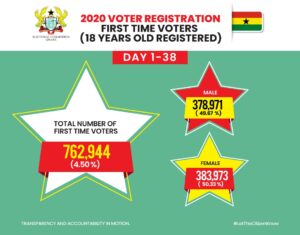A total of 16.9million citizens were registered by the Electoral Commission (EC) during the 38-day voter registration exercise to put together a new voter’s register.
The total number, which exceeded the Commission’s 15 million eligible voters’ target by 1.9 million, was also slightly higher than the 16.8 million in the old register. A little breakdown shows that the new register captured 1.3 million first-time voters.
Describing the exercise as successful, the Commission attributed the success partly to the effective voter registration kits which averagely registered 150 voters per day; but in some instances the kits registered as high as 280 voters per day. Out of the 16.9 million there are 600,000 more women than men, with a breakdown showing 8.8 million women as against 8.2 million men.
When it comes to Persons with Disability (PWDs), there were a total of 64,996 captured in the new register; representing 0.56 percent of the total number of registered voters.
Speaking at the 9th edition of the ‘Let the Citizens Know’ series, a platform created by the EC to engage citizens on the electoral process, the EC Chairperson Jean Adukwei Mensa further gave a breakdown of the type of documents presented by applicants at the registration centers.
She explained that 60.09 percent presented the Ghana Card, while 37.99 percent registered through the Guarantor System, and 1.92 percent registered with their passports.
The Oti Region recorded the highest number of persons who used the Ghana Card for registration with 79.1 percent, while the Bono East Region came top with the Guarantor System with 58.5 percent; but the EC noted that some 61,995 persons, representing 0.37 percent of registered voters, had no fingerprints to capture, therefore – barring any other circumstances – they will be verified through facial recognition in all subsequent election.

“The Upper East Region had the highest rate for this class of applicants; a total of 9,244 applicants were found to have traumatic fingers. It is important to explain that the nature of one’s occupation often accounts for this phenomenon,” Mrs. Mensa said.
She mentioned that for the number of persons whose citizenships were challenged, a major proportion were from the border regions – with Oti Region recording the highest number of cases from a total of 37,762 challenged cases. The number of challenged cases represented 0.2 percent of the total register.
“One of the mechanisms in law for cleaning the register and ridding it of ineligible persons is the Challenge System. The Challenge System contributes to ensuring and guaranteeing the credibility of the register. It enables a qualified registered voter to challenge the registration of an applicant on the grounds that the applicant does not satisfy the laid-down requirement. Namely, that the applicant is not a Ghanaian or that he or she is not 18 years of age or the applicant is not of sound mind,” Mrs. Mensa explained.
She intimated that the Commission is mindful of the infiltration by foreigners and minors into the voter roll, and is confident that the Challenge System adjudication team initiated at all districts across the country will effectively unearth all illegal persons and rid the register of all who do not qualify to be on it.

For the top regional breakdown of the 2020 Voter Register, Greater Accra Region topped with 3,509,805; Ashanti Region followed with 3,013,856; and Eastern Region came third with 1,628,180 while the Central Region recorded 1,566,061.










